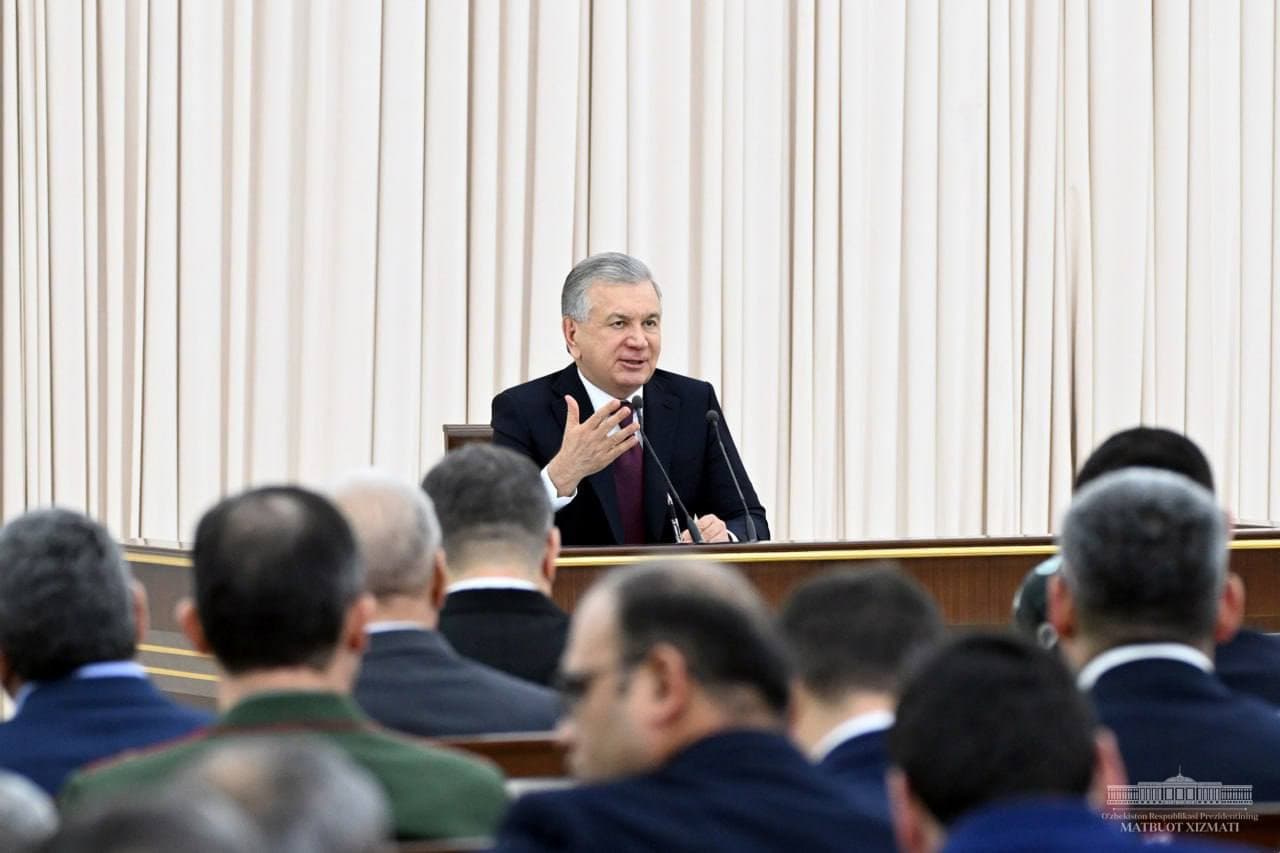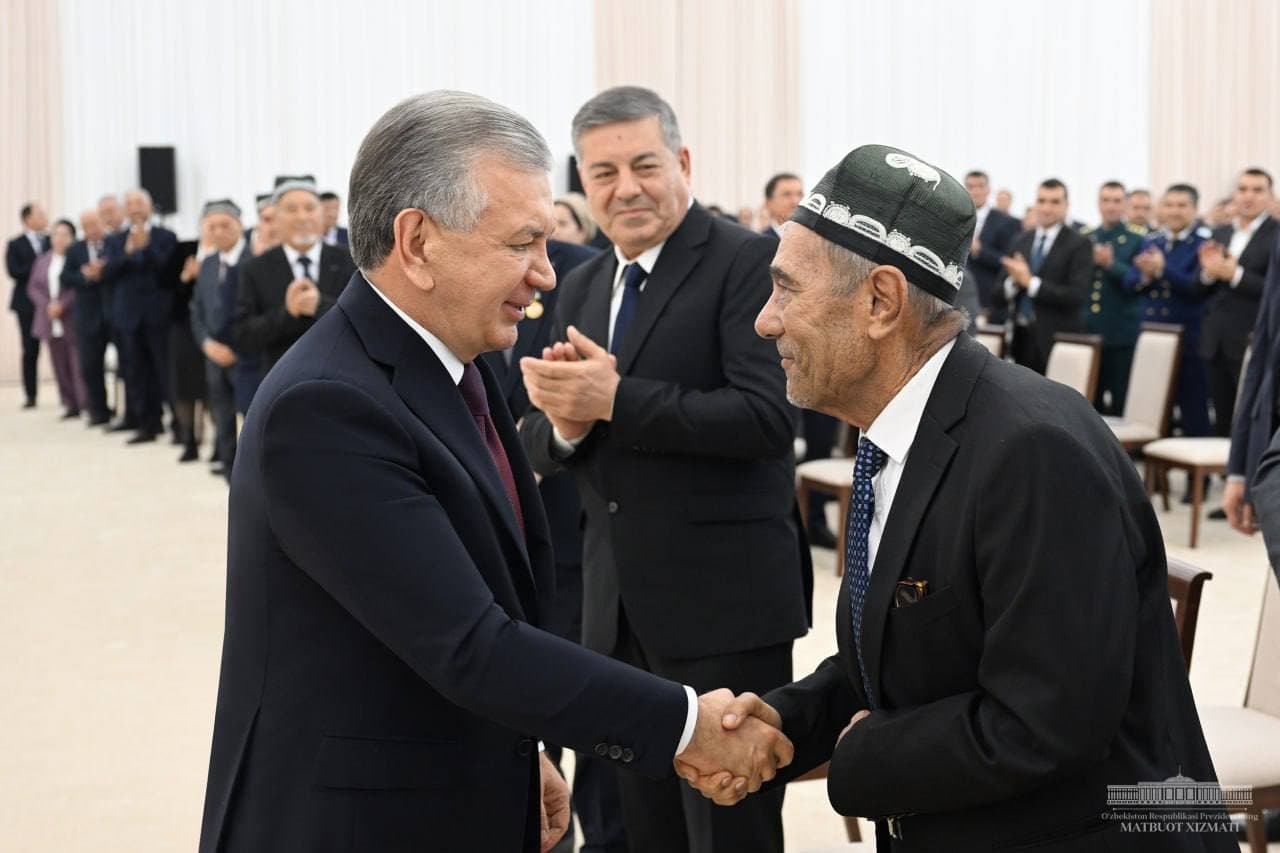Tasks for realizing the untapped potential of Khorezm region discussed
2024-03-01 16:50:00 / Meetings

President Shavkat Mirziyoyev emphasized that every effort is made to exalt human dignity, create decent conditions for the population, and ensure employment.
In particular, 600 thousand jobs have been created in Khorezm over the past seven years. The region’s gross product has reached 37 trillion UZS, and per capita income is 19 million UZS.
In addition, the changing demands of time and the demands and needs of people pose new challenges. Based on this, the meeting identified new opportunities and measures to utilize the existing reserves of the region.
To further support small and medium-sized businesses in Khorezm, $100 million will be allocated on preferential terms. This will help 5.5 thousand entrepreneurs and create 50 thousand permanent jobs.
One of the main tasks in the economy is the development of industry. For this, the state provides the necessary conditions.
Thus, yesterday, a large bridge was opened across the Amudarya, capable of carrying 12 thousand cars and 24 trains per day. This will improve transport connections, reduce the cost of transportation, giving additional incentives to developing businesses and services.
The industry also requires stable energy sources. To this end, in Tuprakkala district, in cooperation with the French company Voltalia, the construction of a solar power plant with a capacity of 100 megawatts, which will be launched by the end of the year, has begun.
In addition, negotiations are underway with leading foreign companies on constructing a large gas chemical complex in Khorezm worth more than $10 billion. If the project is implemented, 3 thousand jobs will be created, and the production of 2.5 million tons of popular polymer products per year will be established.
Measures have been identified to support and accelerate industrial projects. As noted, $100 million from the Industrial Development Fund will be sent to Khorezm.
The Business Development Bank will provide up to 1.5 billion UZS loans for up to 7 years at 18 percent for small and medium-sized industrial projects.
In addition, from April 1, imported equipment, spare parts, and raw materials will be exempt from customs duties for up to 5 years, and VAT payments will be allowed to be deferred for 180 days. Interest on loans taken for localization projects will be covered up to 10 percentage points.
An opportunity is being created to make payments for state property and land plots for five years. Exporters will be compensated for 50 percent of transportation costs when delivering raw materials from other regions.
The investment company, created with the participation of three banks in 2020, will be transformed. It will be able to participate in projects with its share of up to 30 percent. The company will build industrial buildings in the Al-Khwarizmi complex in Urgench and transfer them to entrepreneurs.
Instructions were given on the effective use of the Khazorasp Free Economic Zone, the placement of industrial projects, and creating a technology park in Urgench district.
Opportunities were outlined to increase the production of Damas and Labo cars and their spare parts, increase the degree of cotton processing to 60 percent, and expand the production of pharmaceutical products.
In general, by the end of the year, it is planned to attract investments worth $1.5 billion into the region, of which $1 billion will be foreign investment, which will ensure exports of $600 million. The Head of state mainly focused on the issue of developing entrepreneurship in mahallas, for which 11.5 trillion UZS of loans will be allocated, and programs for the comprehensive development of each district and city will be approved.
“Home industry” will be developed in Khorezm based on Chinese experience, especially in districts like Bagat, Yangiariq, Yangibazar, Koshkupyr, and Urgench. Sericulture and carpet weaving will receive additional support, and households will receive an unsecured loan of up to 100 million UZS for the installation of compact equipment.
As part of the family entrepreneurship program, this year, it is planned to support 5 thousand households engaged in intensive fish farming and 4.4 thousand households involved in sewing, poultry farming, livestock farming, beekeeping, and gardening.
Tourism has been identified as one of the key drivers for the development of Khorezm, and a three-year program will be adopted for its further development.
A visa system “Uzbekistan is my second home” will be introduced for tourists to visit Khorezm without restrictions throughout the year. The Lazgi and Avesto museums will be created in Urgench, and preferential loans will be provided for the construction of hotels and recreational facilities, which will contribute to the growth of the flow of foreign tourists to one million and local tourists to four million, while creating 20 thousand jobs.
Improving the transport infrastructure is necessary to develop the service sector. Therefore, 30 billion UZS subsidies will be allocated to reduce the cost of air tickets to Urgench and other cities of the country with an increase in the frequency of flights. Trolleybus service between Urgench and Khiva will be intensified, and electric buses will be launched from Urgench to Khiva and Khonka.
At the meeting, tasks in agriculture and water management were identified. The need to import and grow cotton varieties resistant to saline soils from China and other countries was emphasized. It was instructed to organize a seed certification laboratory in Urgench and create 40 small refrigerated warehouses in each district.
It was noted that the time has come to introduce scientific approaches to rice growing. The need to adapt Philippine rice varieties that are resistant to salinity to the conditions of Khorezm was noted. A rice seed production enterprise will be established in cooperation with South Korea. It was proposed to allow the export of half of the products to farmers who have increased rice yields to 150 centners per hectare.
New opportunities for expanding livestock farming, poultry farming, and fishing were noted.
The implementation of the second stage of the project to restore the Toshsoka Canal and the progress of concreting the canals were considered. Instructions were given to introduce water-saving technologies on 11 thousand hectares, laser leveling of 42 thousand hectares, and technological renovation of pumping stations.
Particular attention was paid to improving the housing stock and infrastructure of mahallas.
This year, 119 multi-storey buildings will be built, improving the living conditions of 3.5 thousand families. “New Uzbekistan” neighborhoods will be created in Khazorasp, Shavat, and Urgench districts.
It is planned to develop a three-year program to update electrical networks, substations, and transformers. 233 kilometers of roads will be repaired, and internal roads in 322 mahallas will be improved.
Foreign programs will be introduced in higher education institutions of Khorezm, which will provide students with international qualifications. Duplicate processes will be optimized in hospitals and clinics. 500 children with hearing impairments will be provided with cochlear devices, and another 2,000 will receive hearing aids.
In total, $1.1 billion and 10 trillion UZS will be allocated for the activities determined at the meeting.


